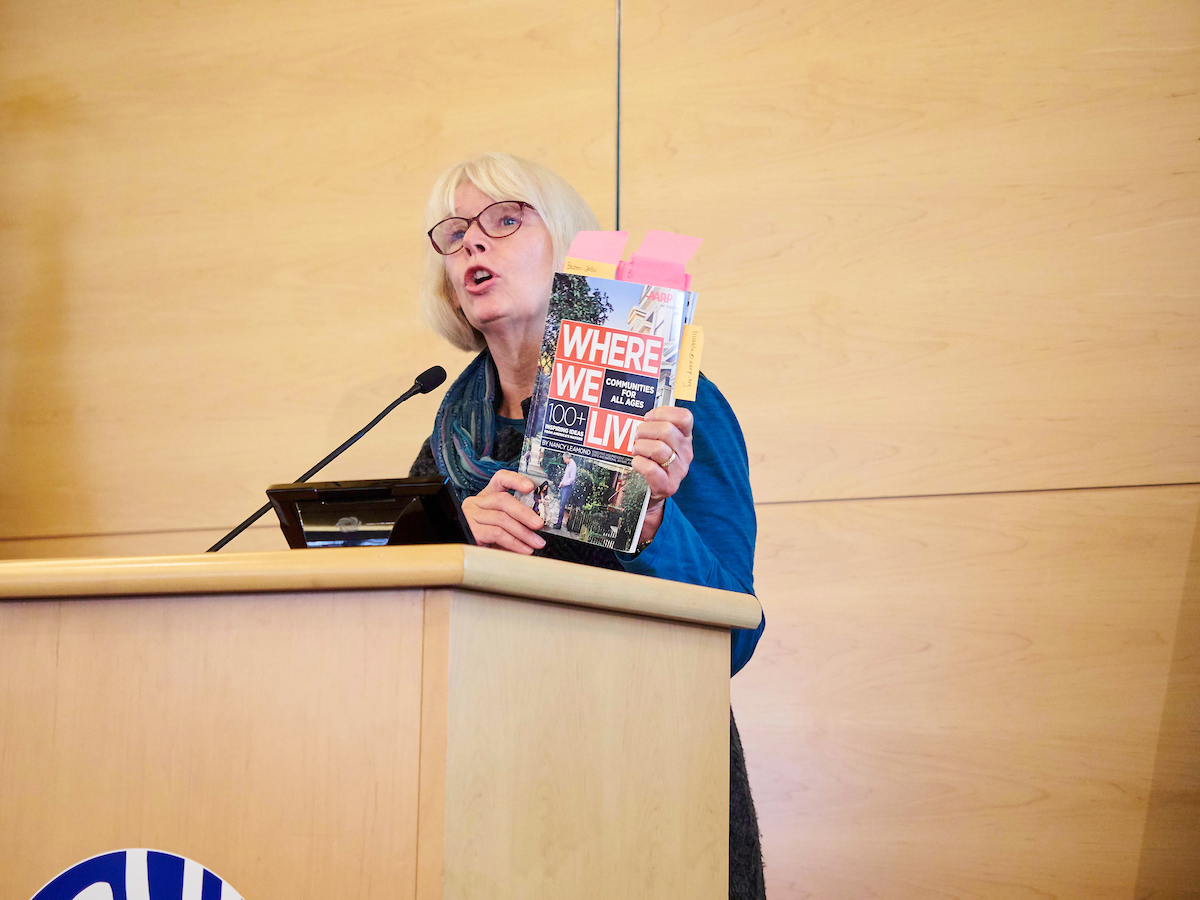A City for All—Civic Hackathon Results

Over the weekend of September 22–24, 2017, more than 100 people came together to create tools that could help Seattle become a more age-friendly community at a hackathon called “‘City for All.”
The event, hosted by the City of Seattle in partnership with AARP and 15 local partners, kicked off on Friday with a welcome from Seattle City Council member Sally Bagshaw (above), a keynote from University of Waterloo’s Colin Ellard that focused on the emotional experience of city life, and lightning talks covering demographic trends in Seattle, housing displacement, and the challenges of designing an age-friendly city.
We then introduced the more than 20 mentors who came to present their own ideas and support teams in developing their own. Mentors came from all over the community, including five City of Seattle departments, Public Health—Seattle and King County, HopeLink, Seattle Housing Assistance Group, and Leading Age Washington. Additional mentors were on hand over the course of the weekend to guide the teams.

Mentor Florence Klein is a member of the ADS Advisory Council and the Age Friendly Seattle Task Force
In the end, teams created nine tools that explored how technology can address the challenges of building an age-friendly community.
- Team Pandora for Streets—won Best Overall Innovation with a map to crowdsource information not typically considered when evaluating the urban environment with data such as noises and smells.
- Team Reflect & Connect—was runner-up for Best Overall Innovation. It used the magic of technology to transform written or spoken journal entries into suggested free activities in the city, with the goal of helping people overcome loneliness and social isolation.
- Team SeaSidewalks—won in two categories: Best Use of Open Data and Best Data Visualization. The tool visualizes data from Seattle Department of Transportation’s recent sidewalk assessment, prioritizing issues as well as points of interest, such as medical facilities, and demographics, to help the Department make the best use of its limited sidewalk repair budget. It can be viewed here.
- Team GoInfo Game—won Best Accessibility Hack with a tool which gamifies crowdsourcing of bus stop data that’s critical for disabled and/or older riders, then makes that data available for use in other tools. The source code is available here.
- Team Speedy Wheels—was runner-up for Best Accessibility Hack, addressing the challenge of requesting specialized rides from public and volunteer services. Currently, for older or disabled riders, finding a ride can be a time-consuming challenge involving numerous phone calls and emails. Check out the presentation from Speedy Wheels here.
- Team Find a Ride++—also created a website to simplify the experience of finding a specialized ride throughout King County. The tool can be viewed here.
- Team Access for Services—created a dashboard visualizing demographic data alongside Aging & Disability Services data.
- Team SeaViz—used virtual reality to visualize 7 years of Aging & Disability Services data on a 3D map of Seattle.
- Team It’s All Downhill from Here—created a taxonomy for road information that could be useful to other app builders.
The winners took home a combined $10,000 in cash prizes, provided by AARP and Sound Generations via an AARP Livable Cities Challenge Grant.

SeaSidewalks won in two categories, Best Use of Open Data and Best Data Visualization.
The City’s Civic Technology Program will follow up with all the projects to determine how they might be able to continue beyond the weekend’s hackathon. To find out more about these projects and how you can support them, please contact Civic Technology Advocate Candace Faber.
Contributor Candace Faber is the civic technology advocate for the City of Seattle and the project manager for City for All.
Photo credit: All photos by Michael B. Maine.
This article originally appeared in AgeWise King County (October 2017)
![Aging & Disability Services for Seattle & King County [logo]](https://www.agingkingcounty.org/wp-content/themes/sads/images/seattle-ads-logo.png)